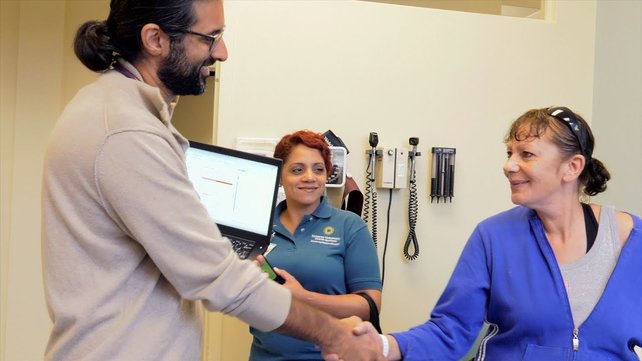Structural Violence in Health Care: The Role of the Academic Institution
CSREA’s Faculty Grant program supports ongoing research by convening strong intellectual communities on campus. Brown faculty members submit proposals detailing events, working groups, or other ambitious inquiries into the most pressing topics pertaining to race, ethnicity, and indigeneity in America for selection each semester.
Fall 2022 Grant Recipient: Dr. Rahul Vanjani, Assistant Professor of Medicine, Clinician Educator, Rhode Island Hospital Center for Primary Care
View the event recording here.
Since medical residency training began in 1889, it has been challenging to balance the educational mandate to provide excellent training for tomorrow’s physicians (in part by facilitating access to patients for clinical learning) with the societal mandate to provide high-quality care for today’s patients. This balance has structural implications, because about 75% of academic health centers are located in underserved communities with predominantly minority populations that are underinsured or uninsured (consider the location of Rhode Island Hospital and Women and Infants Hospital in south Providence).
Thus, “today’s patients” tends to translate to “poor patients of color”: poor Black and Brown patients with limited options are less likely to oppose being treated by a doctor-in-training than are affluent White patients with the resources and privilege to access any care they choose. At the average academic health system (AHC), patients face long wait times (as resident physicians consult attending physicians), poor continuity (attributable to residents’ erratic schedules), and inadequate resources devoted to the care of patients with limited English proficiency or insufficient insurance.
AHCs often lack the resources, staff, and infrastructure to ensure adequate care for patients with complex needs. For patients facing financial, physical, or emotional barriers to optimal self-care, AHCs must navigate conflicts between patients’ needs and those of a health system that may be unable (or unwilling) to accommodate them. These enormous challenges limit the quality of care. Meanwhile, residents and directors of AHCs report high stress levels.
About the Participants
Dr. Rahul Vanjani, Assistant Professor of Medicine, Clinician Educator, Rhode Island Hospital Center for Primary Care
Rahul is a primary care physician with board certifications in Internal and Addiction Medicine. His clinical work is based out of the Rhode Island Hospital Center for Primary Care, the academic residency clinic of Brown University's Internal Medicine residency program. There, he works in the Transitions and Recovery Clinics, where, in partnership with community health workers/peer recovery specialists, he provides primary care and wraparound services to patients with histories of carceral exposure and substance use. Rahul's clinical practice also includes street medicine outreach once weekly in partnership with peers and case managers from House of Hope. Partnering with and teaching medical students and residents is a central part of his clinical work.
Dr. M. Catherine Trimbur, Assistant Professor of Medicine, Clinician Educator, Brown Medicine
M. Catherine Trimbur is an Assistant Professor of Medicine at Brown University with firsthand knowledge of the structural racism that pervades the academic health system and sickens its patients by virtue of her role providing care to patients exiting the carceral system in partnership with community health workers with lived experience at the local academic residency clinic in south Providence.
Dr. Andrea Pitts, Associate Professor of Philosophy, University of North Carolina Charlotte
Andrea Pitts (they/them/elle) is Associate Professor of Philosophy at the University of North Carolina at Charlotte and they are affiliate faculty of the university’s Department of Africana Studies, Center for Holocaust, Genocide, and Human Rights Studies, Latin American Studies Program, School of Data Science, Social Aspects of Health Initiative, and Women’s and Gender Studies Program. Their research interests include Latin American and U.S. Latinx philosophy, critical philosophy of race, feminist philosophy, disability studies, and critical prison studies, and they have taught graduate and undergraduate courses on topics such as carceral medicine, Latina/x feminist philosophy, queer migration studies, prison abolitionism, critical transgender politics, and feminist epistemology.
Cleo Silvers, Healthcare, Justice, and Equality Advocate
Cleo Silvers is a lifelong advocate for healthcare justice and equality. She began her activism as a VISTA Volunteer in the 1960’s in the South Bronx, advocating for the improvement of living conditions to benefit health outcomes. Shortly after, Silvers co-founded the Lincoln Detox Clinic at Lincoln Hospital alongside community members, doctors, and the Black Panthers. Collectively, they penned the Patient’s Bill of Rights, a document that appears in every hospital room around the country. It significantly advanced the standards and ethics of patient care and patient rights in the public discourse, and helped enshrine concepts such as patient dignity, full disclosure and explanation of medical treatment and prescriptions and their side effects, and the right of the patient to refuse treatment.
Silvers continued to advocate for the fair treatment of hospital workers, patients involved in medical research, and strong provider-community relationships. At the age of 60, after stints at Long Island University, Mount Sinai Hospital, and SEIU Hospital Workers Union East, Silvers graduated Summa Cum Laude and was the class valedictorian when she received a bachelor’s degree in Labor Relations from Cornell University. Now retired, Silvers continues her advocacy work at Cossitt Library in Memphis, TN.
Dr. Lisa Biggs, John Atwater and Diana Nelson Assistant Professor of the Arts and Africana Studies, Artistic Director of Rites and Reason Theater (Moderator)
As an artist and a scholar, Dr. Biggs is interested in the role of the arts, and performance more broadly writ, in movements for social justice in the United States. Her current scholarship investigates the role of the arts in movements for social justice. Her monograph, tentatively titled Beyond Incarceration, records and theorizes the impact of theatre programs for incarcerated women in the U.S. and in South Africa, and is under contract with the Ohio State University Press.

